Search
Viewing 1920 to 1935 of 3120 news
-
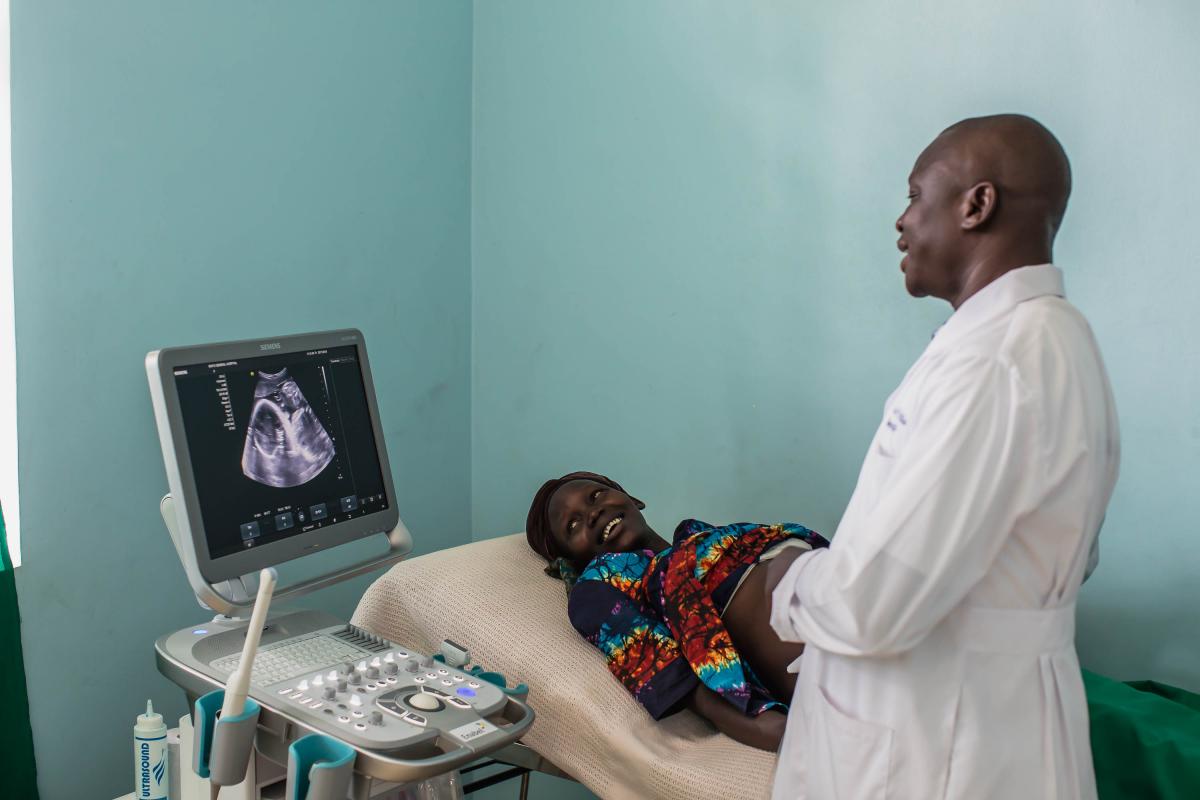
Zombo residents celebrate restoration of x-ray services
William YEKA | 13/07/2021
Expectant mothers in Zombo and surrounding areas can now breathe a shy of relief following the reinstatement of the Imaging Unit at Holy Family Hospital Nyapea. The unit was closed by the Atomic Energy Council of Uganda in 2015 over failure to meet basic minimum standards. The shutdown meant that patients had to travel long distances to access x-ray services from private health facilities in neighbouring districts at exorbitant fees. However, there is now a reason to smile. The hospital was donated imaging equipment by the Strategic Purchasing of Health Services (SPHU) and Private Not for Profit (PNFP) projects of Enabel. While the support was a major boost, the facility could not instantly use the items. Holy Family Hospital Nyapea lacked skilled manpower to operate the machines. To address the challenge, Enabel, through the Support to the Development of Human Resources project, sponsored one staff member to pursue a diploma in diagnostic ultrasound. The imaging unit, which 5 years ago was non-existent, is now fully functional and serves at least 30 patients daily, mostly expectant mothers. “Timely performance of imaging examination has eased work since we make quick clinical care decisions,” says Dr Okello Pius, the Officer In charge of the Maternity Ward. That is not all. The facility has registered an increase in revenue from user fees which management attributes to the imaging unit. Measures are in place to ensure sustainability. The trained sonographer is currently mentoring colleagues to do the same work. The hospital is also sponsoring another staff member to pursue a diploma in medical radiography to meet the growing demand. Holy Family Hospital Nyapea commonly referred to as Nyapea Hospital is a private not-for-profit faith-based health facility in Zombo district.
-

Switching to light: Electricity access - Stories of change
Denise NSANGA | 07/07/2021
The Government of Rwanda has a target of reaching 100% electricity access by 2024, where 52% of connections are planned through on-grid and 48% through off-grid connections. With Electricity Access Rollout Program (EARP), Belgium has a grant funding of 39M euros as a contribution to reach the universal electricity access target. Implemented in partnership with Rwanda Energy Group (REG), the BE-EARP project so far constructed over 1,000 km of power network particularly in the Eastern Province districts of Rwamagana, Kayonza, Ngoma and Kirehe. Alongside, the project has connected among others 25 schools, 11 health posts, 400 plus businesses and Small and Medium Enterprises (SMEs), and 32 public administrations. The project also funded the upgrade of 50 km of power distribution network in Rubavu, a picturesque western border town of Rwanda. Today, the stories of the beneficiaries reaping the benefits of BE-EARP electrification-funded projects, expectedly, have been amazing. Discover them below.
-
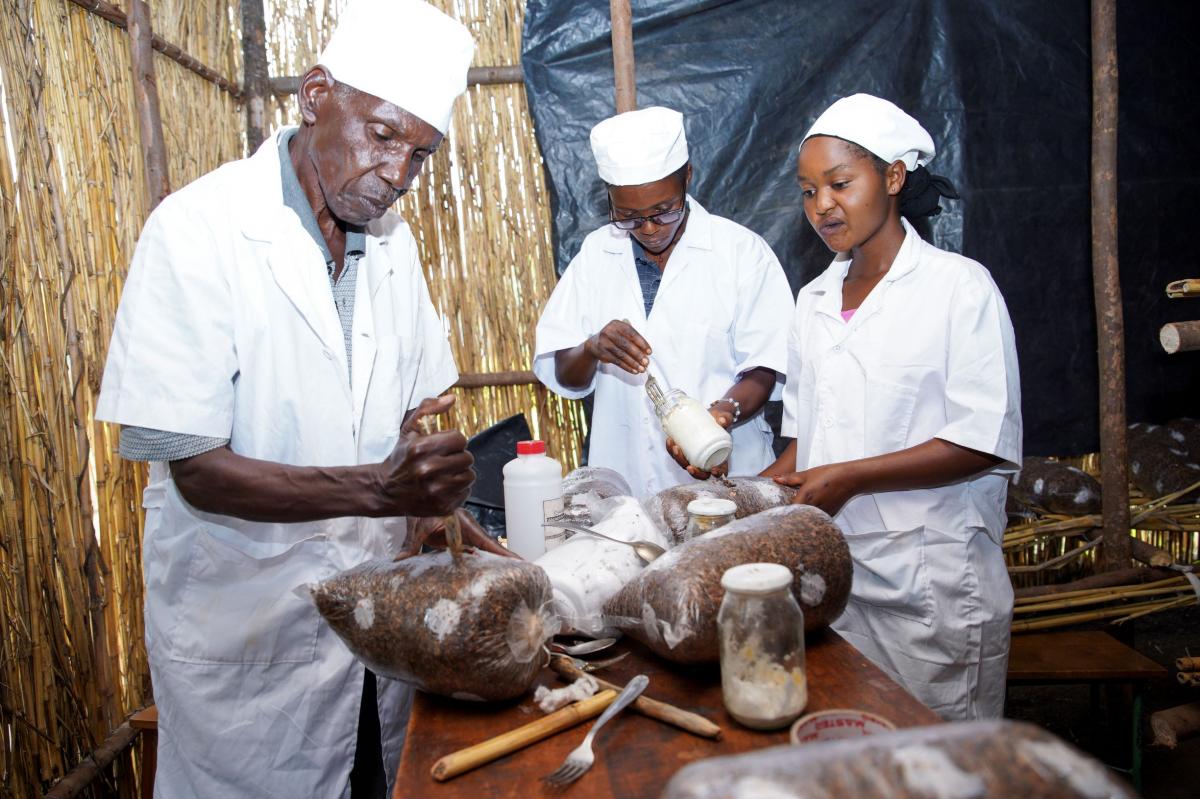
Vers l’amélioration de l’adéquation formation-emploi dans le secteur de l’Enseignement de la Formation Technique et Professionnel (EFTP)
Donavine KWIZERA | 07/07/2021
Au Burundi, l’un des objectifs du projet ACFPT est de contribuer à améliorer la qualité de la formation dans les filières présentes dans 13 Centres d’Enseignement des Métiers (CEM). Cependant, d’immenses défis persistent au niveau du suivi post-formation, notamment pour l’insertion des lauréats et leur employabilité sur le marché du travail. C’est pour relever ces défis qu’Enabel vient de signer une convention ayant pour objet l’octroi d’un subside à un consortium de 5 chambres sectorielles membres de la Chambre Fédérale du Commerce et de l’Industrie du Burundi (CFCIB) identifiées sur base des filières enseignées dans les CEM appuyés par le projet. Dans le cadre du partenariat public-privé, ce consortium a pour mission de contribuer à l’amélioration de l’adéquation formation-emploi dans le secteur de l’EFTP à travers la participation des opérateurs économiques dans la gestion des mécanismes d’insertion durable et de qualité des lauréats des CEM. Il devra mettre en place des stratégies et des activités visant à réduire le fossé existant entre les besoins du marché et l’offre de formation. Les activités ont officiellement été lancées lors des ateliers organisés les 28, 30 juin et 2 juillet, respectivement dans les provinces de Gitega, Muyinga et Cibitoke. L’occasion de mettre en lien les différents acteurs concernés, de les sensibiliser et réfléchir ensemble sur les actions qui seront menées collectivement.Conscientes des enjeux, les autorités administratives présentes ont exprimé leur engagement à soutenir le sous-secteur de l’EFTP qui figure dans les stratégies nationales pouvant contribuer aux solutions durables pour renforcer l’emploi des jeunes burundais.
-
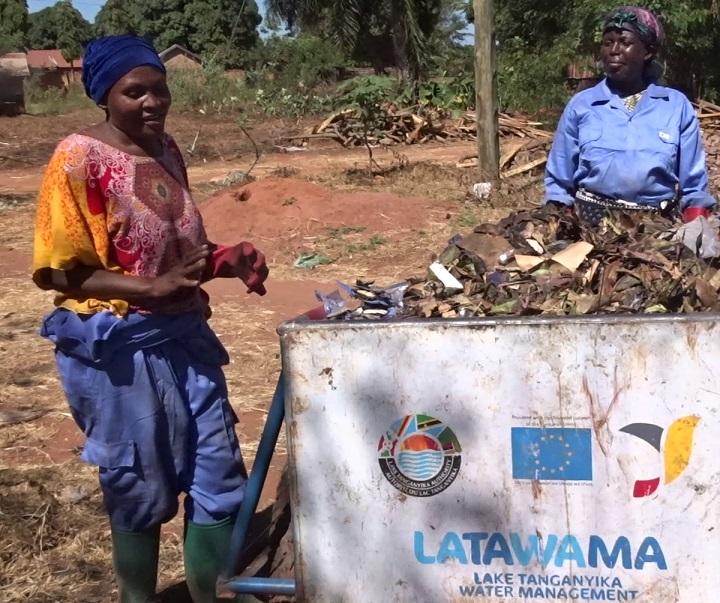
Kigoma, Tanzanie : Des actions d’optimisation de la gestion des déchets solides qui portent des fruits : les bénéficiaires s’expriment
Rodrigue NIYONGABO | 02/07/2021
Dans la ville de Kigoma, en Tanzanie, le projet LATAWAMA est opérationnel depuis janvier 2020. De nombreuses activités y sont menées. N’étant pas « un prêt à porter » les activités mises en œuvre ont été définies conjointement avec les principaux acteurs identifiés et divers intervenants. Les organisations à base communautaire sont des acteurs clés du cycle de gestion des déchets. D’autres actions à haut impact en matière de gestion des déchets ont été également initiées. Les bénéficiaires se sont confiés à l’équipe technique du projet. Les retours sont encourageants. Les organisations à base communautaire sont composées de femmes, chefs de ménages et de jeunes issus de milieux défavorisés avec un maximum de 10 personnes par organisation. Les membres de ces organisations sont responsables de la pré-collecte des déchets solides depuis différents lieux (ménages, marchés, institutions, etc.) jusqu’aux points de collecte (bennes basculantes gérées par la Municipalité). Elles sont une composante importante de la stratégie d’intervention du projet guidée par quatre principes: accroître la couverture des services, renforcer les capacités de gestion, introduire les principes de l’économie circulaire (utiliser les déchets d’hier comme ressource de demain), organiser des campagnes de sensibilisation et d’éducation.Initialement, les organisations à base communautaire étaient confrontées à deux grands défis : équipements insuffisants et inadéquats et capacités d’organisation et de gestion faibles. Face à ce constat, le projet LATAWAMA leur a fourni un premier soutien technique qui renforce leurs capacités d’intervention et a initié une série d’actions pour leur renforcement organisationnel. Des bénéficiaires satisfaits des réalisations du projet LATAWAMA Les membres des organisations à base communautaire ayant bénéficié directement de l’appui du projet LATAWAMA affirment que le matériel donné est venu à point nommé. Bahati Rhamadhani, mère d’environ 40 ans, vit dans la localité de Katubuka. Avec ses amies, en train de collecter les déchets, elle affirme que les équipements que le projet LATAWAMA a donné permettent de mener à bien le travail de collecte de déchets. « Avec ce travail, nous gagnons de l’argent et ça nous aide à satisfaire une partie de nos besoins. Nous remercions donc le projet LATAWAMA qui nous a donné du matériel. Comme vous pouvez le remarquer, Le défi majeur est que la population mélange encore les déchets ménagers avec d’autres choses comme les pierres, les briques et même les aiguilles. Nous essayons de les sensibiliser pour un changement de comportement », affirme-t-elle. Elishaphat Ruzemvya, Directeur du département en charge de la gestion des déchets solides, affirme que l’appui a été d’une grande importance pour améliorer la gestion des déchets solides à Kigoma. « Je suis ici pour témoigner de l’importance de l’appui apporté par le projet LATAWAMA en matière de gestion des déchets solides dans la municipalité de Kigoma. J’adresse mes remerciements à Enabel et à l’Union européenne pour l’appui apporté et je peux garantir que l’appui en termes d’équipement sera géré efficacement pour une grande durabilité ». D’autres actions ciblées initiées par le projet… A côté des actions menées à travers les organisations à base communautaire, des réalisations comme l’appui de l’hôpital Maweni en matière de gestion des déchets solides sont en cours. Rashidi Masoudi, agent d’hygiène, affirme que la situation s’est nettement améliorée en matière de gestion des déchets solides dans cet hôpital. « Avant le travail était beaucoup plus difficile. On brûlait les déchets dans un endroit qui n’était pas adéquat. Avec la réparation de l’incinérateur, le travail devient plus facile. Les déchets y sont brûlés. Nous avons été formés sur la gestion des déchets biomédicaux. C’est la 5ème année que je travaille à l’hôpital de Maweni. Les choses vont très bien maintenant ; tous les déchets qui sont produits ici sont brulés complètement ». Pour Rajabu Hassan, Ingénieur biomédical, avant, l’hôpital disposait d’un incinérateur de mauvaise qualité, qui ne pouvait pas brûler les déchets selon les standards environnementaux acceptables. « Le projet LATAWAMA nous a permis de réparer l’incinérateur qui permet de brûler les déchets rapidement. Les cendres qui sont générés sont également mis dans la nouvelle fosse qui répond aux normes de l’Organisation Mondiale de la Santé et du ministère ayant dans ses attributions la santé publique. Nous sommes tous conscients que les déchets biomédicaux sont dangereux et nous sommes reconnaissants envers le Projet LATAWAMA ». Rajabu Hassan souhaite néanmoins poursuivre la collaboration avec le projet qui financera la construction du bâtiment destiné au stockage des déchets biomédicaux triés en attente d’incinération. Financé par l’Union européenne, le projet LATAWAMA est mis en œuvre par Enabel, en collaboration avec l’Autorité du Lac Tanganyika.
-
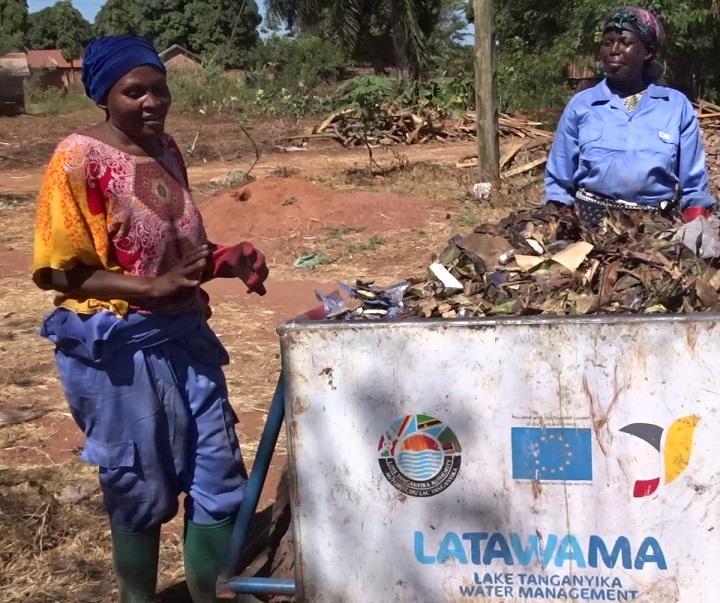
Kigoma, Tanzania: Actions to optimise solid waste management bear fruit
Rodrigue NIYONGABO | 02/07/2021
In the city of Kigoma, Tanzania, the LATAWAMA project has been active since January 2020. Many activities have been carried out. As the project was not a “ready-made project,” the activities have been defined and the main actors identified with the full participation of various stakeholders. Community-based organisations are one of the backbones of solid waste management operations. Besides, other actions in waste management have also been undertaken. Beneficiaries talked to the technical team. The feedback is heartening. Community-based organizations are composed of women heads of households and young people from disadvantaged backgrounds, with a maximum of 10 people per organisation. They are responsible for the pre-collection of solid waste from different places (households, markets, institutions, etc.) to the collection points (tippers managed by the Municipality). They are keys players of a project guided by four principles: increasing service coverage, strengthening management capacity, introducing the principles of the circular economy (using yesterday’s waste as a resource for tomorrow), organising awareness and education campaigns. At the beginning of the project, community-based organizations faced two major challenges: inadequate facilities and weak organisational and management capacities. The LATAWAMA project provided technical support to community-based organisations to ensure that they could carry out their mission and initiated a series of actions for organisational strengthening. Partners satisfied with LATAWAMA project achievements The members of the community-based organizations directly supported by the LATAWAMA project said that the material given was of paramount importance. Bahati Rhamadhani is a mother of about 40 years, living in the locality of Katubuka. With her friends, while collecting the waste, she said that the equipment that the LATAWAMA project gave them makes it possible to collect the waste. “With this work, we get money, and it helps us meet some of our needs. We, therefore, thank the LATAWAMA project which gave us material”. The remaining challenge is that the population still mixing household waste with other things like stones, bricks, and even needles.“ We try to sensitize them for a behavior change”, she said. The same goes for Elishaphat Ruzemvya, Director of the department responsible for solid waste management. He said that the support was of great importance for improving solid waste management in Kigoma: “I am here to attest to the importance of LATAWAMA’s support for solid waste management in the Municipality of Kigoma. I would like to thank Enabel and the European Union for their support. I can guarantee that the support in terms of equipment will be managed effectively for great sustainability”. Other actions initiated by the project… In addition to actions carried out through community-based organisations, further activities such as the support of the Maweni Hospital for solid waste management have also been initiated. Rashidi Masoudi, a health officer, said the situation had improved significantly in solid waste management at this hospital: “Before, the work was much more difficult. The waste was burnt in a place that was not adequate. With the repair of the incinerator, the work became easier. We have been trained in biomedical waste management. This is the 5th year that I work at Maweni Hospital. Things are going very well now; all the waste produced here is burned completely”. For Rajabu Hassan, Biomedical Engineer, the hospital used to have a poor-quality incinerator, which could not burn waste according to acceptable environmental standards. “The LATAWAMA project repaired the incinerator that allows us to burn waste quickly. The ashes generated are also put in the new pit that meets the standards of the World Health Organization and the ministry of public health. We are all aware that biomedical waste is dangerous, and we are grateful to the LATAWAMA Project.” Nevertheless, he would like to further collaborate with the project, which will fund the construction of the disposal hall of sorted waste awaiting incineration. Funded by the European Union, the LATAWAMA project is being implemented by Enabel in collaboration with the Tanganyika Lake Authority.
-
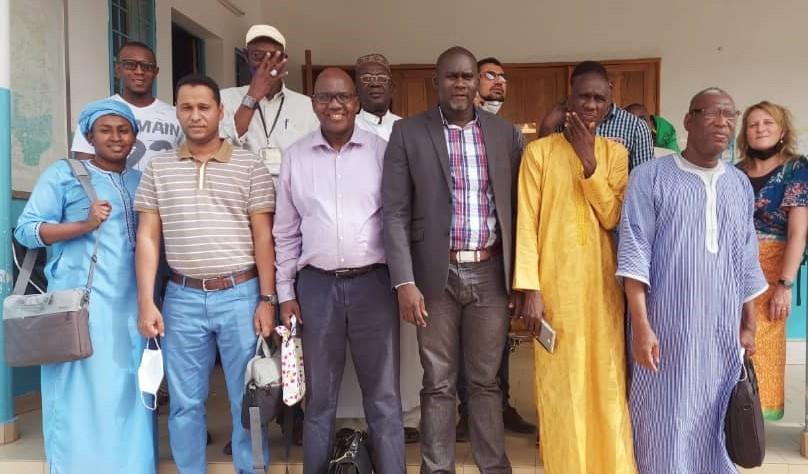
Visite de partage d’expérience de la Mauritanie sur le modèle sénégalais afin de contribuer à l’opérationnalisation de l’Assurance Maladie Volontaire
Aminata KANE | 30/06/2021
Afin de contribuer à l’amélioration de l’accessibilité financière des populations des secteurs informels et ruraux aux soins de santé de qualité, l’état mauritanien a procédé au lancement par le Ministre de la Santé, le mardi 18 novembre 2020 à Nouakchott, d’un régime d’assurance maladie volontaire (AMV) dénommé les Caisses Régionales de Solidarité Santé (CRESS).Les CRESS visent à concourir à la couverture sanitaire universelle en Mauritanie ; phase pilote de mise en œuvre effective dans trois régions sanitaires de la Mauritanie (Brakna, Dar Naim et Sebkha). En tenant compte de toutes les contraintes et défis que peut susciter l’opérationnalisation de ce régime d’assurance volontaire, un des piliers de ce programme est de renforcer les capacités du personnel administratif pour une gestion efficace et efficiente des CRESS, en se basant sur les expériences des autres pays de la sous-région. Dans ce cas ci celui du Sénégal. Le Sénégal qui a testé un modèle de mutualisation du risque lié à la maladie, avec l’Unité Départementale d’Assurance Maladie (UDAM) de Foundiougne et celle du département de Koungheul, constitue une opportunité pour l’équipe des CRESS d’apprendre des leçons de cette expérimentation. Une visite aux UDAM constitue un retour d’expérience enrichissant pour cette phase d’opérationnalisation de l’assurance maladie volontaire en Mauritanie. Ce voyage d’étude au Sénégal a permis de réaliser un retour d’expérience sur la gestion et l’opérationnalisation de la couverture maladie universelle dans les départements de Koungheul et de Foundiougne. Plus précisément:Un retour d’expérience sur le fonctionnement de l’UDAM au SénégalÉchanges sur les meilleures pratiques sur l’opérationnalisation et les difficultés rencontrées dans la mise en place de cette expérience d’assurance maladie volontaire.Visite de terrain pour analyser la gestion quotidienne des adhésions et des prestations de soins couvertes dans les deux districts sanitaires.Capitaliser sur les expériences du Sénégal au bénéfice de la MauritanieLes résultats qui sont ressortis de la mission sont:L’expérience des UDAM des départements de Koungheul et de Foundiougne est connue et comprise par les membres de la mission, notamment dans les domaines suivants : paquet de soins couverts, mode de gestion, régulation avec les prestataires, mise en œuvre du plan de communication pour la mobilisation sociale, etc.Les mécanismes de financement et de pérennisation des UDAM par l’état sénégalais sont connus et évaluésLes leçons sont apprises sur le modèle de management et de promotion de la mutualisation du risque lié à la maladie dans les départements de Koungheul et de Foundiougne : bonnes pratiques et difficultés rencontréesL’expérience du Sénégal est capitalisée pour l’initiative mauritanienne.Lors de la réunion de synthèse les points forts retenus sont que la mission a été un succès qui a permis à la Mauritanie d'avoir toutes les réponses aux questions qu'elle se posait. Les éléments qui ont été le plus mis en avant sont:l'importance de la qualité et proximité de l'offremission inspirante et enrichissantedévelopper la synergie entre l'offre et la demanderenforcement du dialogue interaction continue grâce à la mise en contact valorisation partenariat Mauritanie/Sénégalapproche inclusive de la populationéchanges de conseils techniques...Les priorités selon le représentant du ministère de la santé mauritanien Dr Moctar M’KHAITIR sont:une mise à niveau de l'offre de soins (répondre aux attentes de la population, améliorer équipements et Ressources Humaines)pousser à l’adhésion en donnant confiance via une sensibilisation efficace; " la santé n'a pas de prix mais elle a un cout"un engagement de l’État et des partenairesPour finir, cette mission a été productive et satisfaisante pour tous les partis. Une mise en lien a été faite et les équipes resteront en interaction continue. Les remerciements ont été chaleureux et indicateurs du bon déroulement tout au long de la mission. La réflexion sur l'ancrage des CRESS a été lancé, en attente des bons résultats à venir.
-
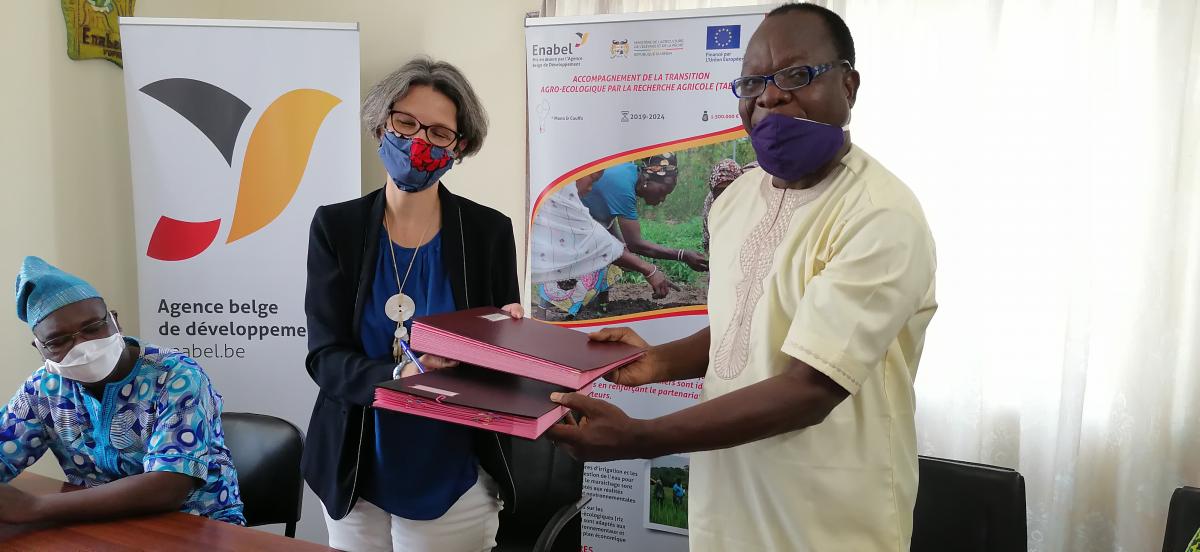
Signature de conventions de partenariat entre Enabel au Bénin et les universités nationales de Parakou et d’Abomey-Calavi
Reece-hermine ADANWENON | 30/06/2021
Réunir les acteurs du secteur agricole autour des recherches participatives dont les produits profitent aussi bien aux chercheurs qu’aux producteurs : tel est le but du projet TAERA (Transition Agro-Ecologique par la Recherche Agricole) financé par l’Union Européenne et mis en œuvre par Enabel au Bénin. Pour atteindre cet objectif, plusieurs étapes sont à franchir dont l’une d’elle est la signature de conventions de subside avec les universités nationales de Parakou et d’Abomey-Calavi qui a eu lieu le lundi 28 juin 2021 au Ministère de l’Agriculture, de l’Elevage et de la Pêche (MAEP).C’était en présence des responsables des universités, du chargé de programme de l’Union Européenne, du représentant d'Enabel, des représentants des organisations professionnelles de producteurs de riz et de produits maraîchers. Au Bénin, plusieurs innovations probantes sont issues de la recherche mais ne sont pas largement diffusées auprès des producteurs. De même, plusieurs innovations endogènes sont mal connues, mal documentées et par conséquent très peu diffusées. C’est pour apporter une solution à cet état de chose, que le projet TAERA s’est donné pour but de regrouper les chercheurs et les producteurs autour de thématiques de recherches co-définies pour aboutir à des solutions scientifiquement prouvées et auxquelles les producteurs s’identifient. Les conventions de subside signées entre ces différents acteurs permettront respectivement aux Universités d’Abomey-Calavi et de Parakou de : - valider les innovations agroécologiques performantes pour les systèmes de production maraîchère et rizicole et élaborer un référentiel d’aide à la décision dans le domaine de la transition agro-écologique ; - proposer des solutions « bonnes pratiques » adaptées en matière de gestion de l’eau dans les systèmes de maraîchage irrigués et les systèmes rizicoles de bas-fond sur la base de suivi technico-économique des modèles d’irrigation. Pour y parvenir, des doctorants, au nombre de deux par université, sont recrutés et seront accompagnés d’étudiants en master. Des expérimentations seront installées en collaboration avec les organisations de maraîchers et de riziculteurs sur les champs de ceux-ci. Ces universités sont représentées à leur tour par le Laboratory of Genetics Horticulture and Seed Sciences ou GBioS pour l’Université d’Abomey-Calavi et le Laboratoire d’hydraulique et de modélisation environnementale ou HydroModE-Lab pour l’Université de Parakou. En procédant à la signature de ces conventions, Mme Mélanie Xuereb, Country Portfolio Manager, a, au nom du Représentant Résident d'Enabel au Bénin, adressé ses remerciements au bailleur, l’Union Européenne et au partenaire de mise en œuvre, le Ministère de l’Agriculture, de l’élevage et de la pêche, ainsi qu’à toute la famille d’acteurs intervenant dans le projet, pour leur grande disponibilité et leur forte implication dans la formulation et la concrétisation du projet. Mme Mélanie Xuereb renouvelle, au nom de Enabel, l’engagement à relever les défis de la transition agro-écologique. Le Chargé de programme de l’Union européenne, M. Jean Huchon, a, pour sa part, souhaité à l’ensemble des partenaires du programme, une coopération fructueuse, ainsi que des résultats à la hauteur des enjeux du secteur pour le Bénin. A en croire M Jean Huchon, le projet TAERA dans son ensemble, contribue au renforcement des capacités nationales de la recherche agricole en générant des connaissances et des innovations scientifiques et technologiques dans les domaines de la production, de la transformation, de l’économie, des questions sociales et de l’organisation générale des chaînes de valeur. Il permettra également de développer l’architecture de la recherche nationale pour être plus efficace et propice à l’innovation et apportera des connaissances et des preuves pour alimenter les politiques et les décisions d’investissement. Quant au doyen de la Faculté d’agronomie de l’Université de Parakou, il a exprimé sa reconnaissance à l’Union Européenne, à Enabel, ainsi qu'à toutes les institutions pour leur soutien indéfectible et leur contribution à la mise en œuvre de cette intervention. Le Professeur Michel Batamoussi est convaincu que cette intervention donnera des résultats tangibles et aboutira à plusieurs autres collaborations futures. Rappelons que le projet Taera (Transition Agro-Ecologique par la Recherche Agricole) mis en œuvre par Enabel et financé par l’Union Européenne à hauteur de 1,5 millions d’euros (soit 984 millions de FCFA), s’inscrit dans le cadre de l’initiative Desira (Development Smart Innovation through Research in Agriculture). Il intervient dans les communes du Mono et dans deux communes du Couffo que sont Dogbo et Lalo, et travaille avec les producteurs maraîchers et riziculteurs pour la période 2019-2024. Taera vise à proposer des solutions innovantes fondées sur les résultats de la recherche-action menée en partenariat avec les acteurs locaux de la recherche ainsi que les producteurs pour une transition agro-écologique concertée au sein des filières maraîchage et de la riziculture.
-
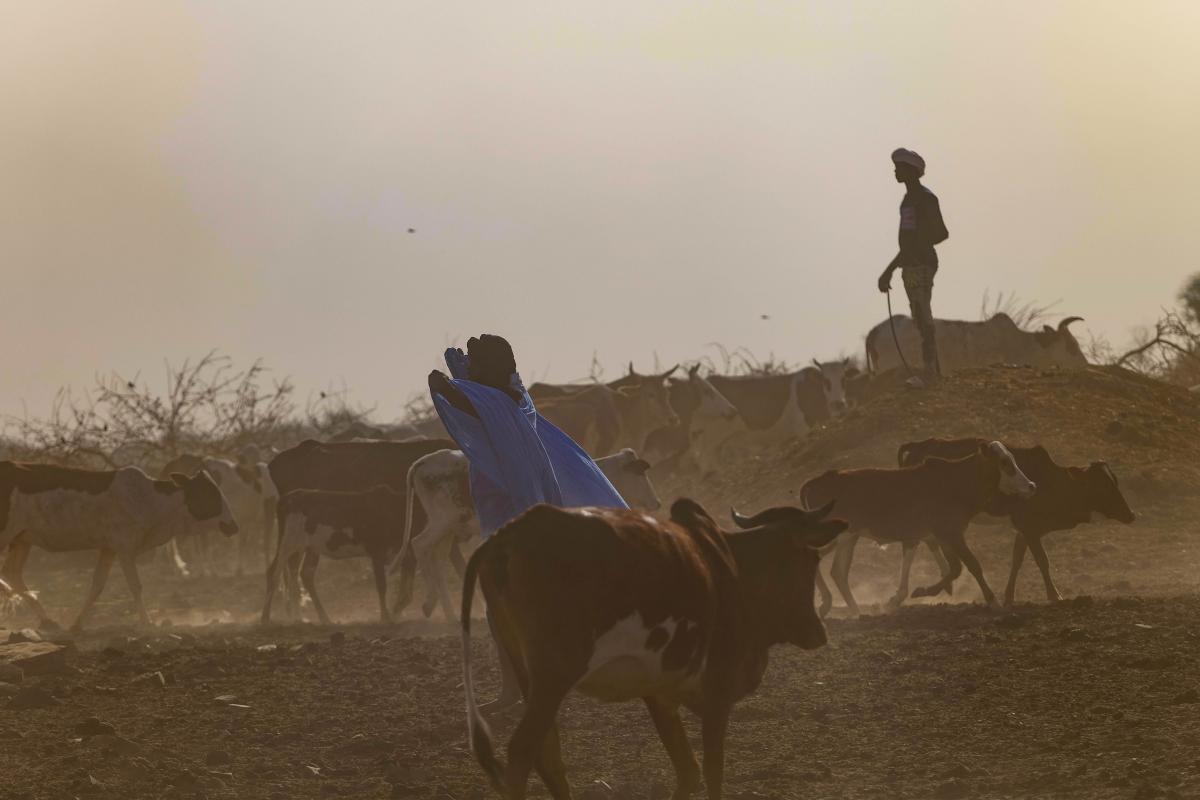
Enabel promeut une approche novatrice de vulgarisation auprès des pasteurs en Mauritanie
Aminata KANE | 29/06/2021
Le programme RIMFIL (Promotion du développement des filières agricoles et pastorales durables) d'Enabel Mauritanie a organisé un atelier de formation dont la finalité est d’accompagner des acteurs pastoraux tant en termes de structuration que d’acquisition de compétences organisationnelles ou techniques par la formation des facilitateurs autour d’un Champ Ecole Pastoral (CEP) au niveau du bassin laitier du Hodh El Charghi du 14 au 20 juin. La cérémonie d'ouverture de l'atelier de formation a eu lieu en présence du Hakem de Timbedra, du Maire de la commune de Timbedra et de l'inspecteur du ministère de l'élevage de la Moughataa de Timbedra.Selon l'expert promotion filières agricoles et pastorales durables Abder Benderdouche : " L’action d’Enabel vise à promouvoir et à renforcer le développement de chaînes de valeur agricoles et pastorales inclusives et durables, comme des leviers à la fois de croissance, mais aussi de résilience au changement climatique, de lutte contre la pauvreté et d’insécurité alimentaire". Grace à ces formations le programme RIMFIL contribuera à la construction d´un dispositif structuré et durable de conseil agro-pastoral sur les bassins de production basé sur la formation de formateurs au niveau des CEP/CEAP.Toujours d'après l'expert Benderdouche: "En termes de groupes cibles, le RIMFIL s’adressera à des communautés vulnérables en s’efforçant de mettre l´accent sur les jeunes et les femmes, et les encouragera à devenir des facilitateurs CEAP (Champs-écoles agricoles et pastoraux). A cet effet, les CEAP habiliteront et permettront aux petits exploitants agricoles, à leurs familles et aux communautés rurales de comprendre et de réagir aux défis actuels et d’apporter leurs propres contributions essentielles".L’objectif général est de mettre en œuvre un dispositif structurant de renforcement de capacités/formations de facilitateurs par le biais de l’approche Champ Ecole Agro Pastoraux (CEAP) et basé sur un curriculum de formation validé de façon participative avec tous les acteurs impliqués. Ces facilitateurs formés mis en réseau seront les relais d’un futur dispositif de conseillers éleveurs de proximité au sein des bassins de production. Permettra au RIMFIL de contribuer à la construction d´un dispositif structuré et durable de conseil agro-pastoral sur les bassins de production basé sur la formation de formateurs au niveau des CEP/CEAP.Les Champs-écoles pastoraux sont élaborés sur la base d’une approche participative avec une forte préoccupation de durabilité environnementale et de viabilité économique, ce qui apporte une implication forte des bénéficiaires et communautés.Les CEP sont une approche novatrice de vulgarisation auprès des pasteurs qui se basent sur la pratique et l'apprentissage. Pour garantir la durabilité de l'action, Enabel prévoit un suivi régulier des facilitateurs.
-
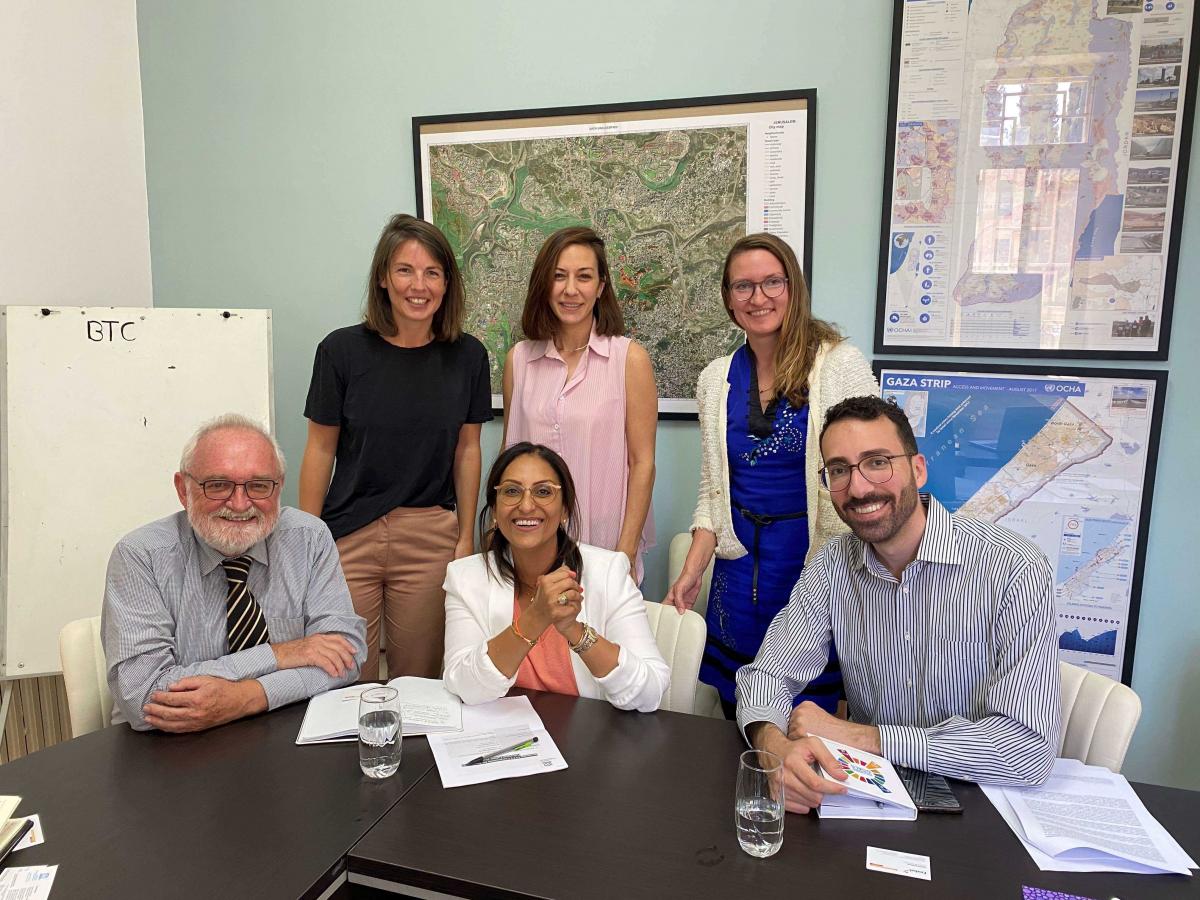
Enabel Palestine signs and agreement with UNESCO
Roula HANDAL | 28/06/2021
UNESCO and Enabel Palestine have recently signed a cooperation agreement titled “TVET Competencies for Youth in the Palestinian Labour Market”. The joint cooperation is an integral part of the Skilled Young Palestine intervention, already implemented by Enabel in cooperation with the Ministry of Labour.This agreement is the first formal cooperation between Enabel Palestine and UNESCO and will contribute to increasing the quality of the TVET-system and its outputs and will strengthen the local innovation eco-system with specific attention to inclusion.The agreement is signed for a period of two years and will kick-off with the set-up of a sectoral innovation hub. Other activities include working on updating the Skills Forecasting Model, development of online TVET courses and training of trainers. Another component of the project will focus on inclusion in TVET, both at policy level and implementation level.The two partners are looking forward to starting off the activities, and will work closely together with their partners throughout the implementation.
-

The creation of a semi-public sports field in College Des Frères - Beit Hanina
Roula HANDAL | 28/06/2021
In the frame of Resilience in Schools of East Jerusalem (RiSE) project, Enabel has recently finished implementing a semi-public sports field in Collège des Frères de la Salle in Beit Hanina during April 2021. The space with an area of 2000 m2 is featuring a football pitch, a basketball court, outdoor seating steps, running tracks and an outdoor gym area with necessary amenities. Space will be used by the school students during school hours and will be open to the community after school hours. This project is funded by the European Union and Belgium.
-
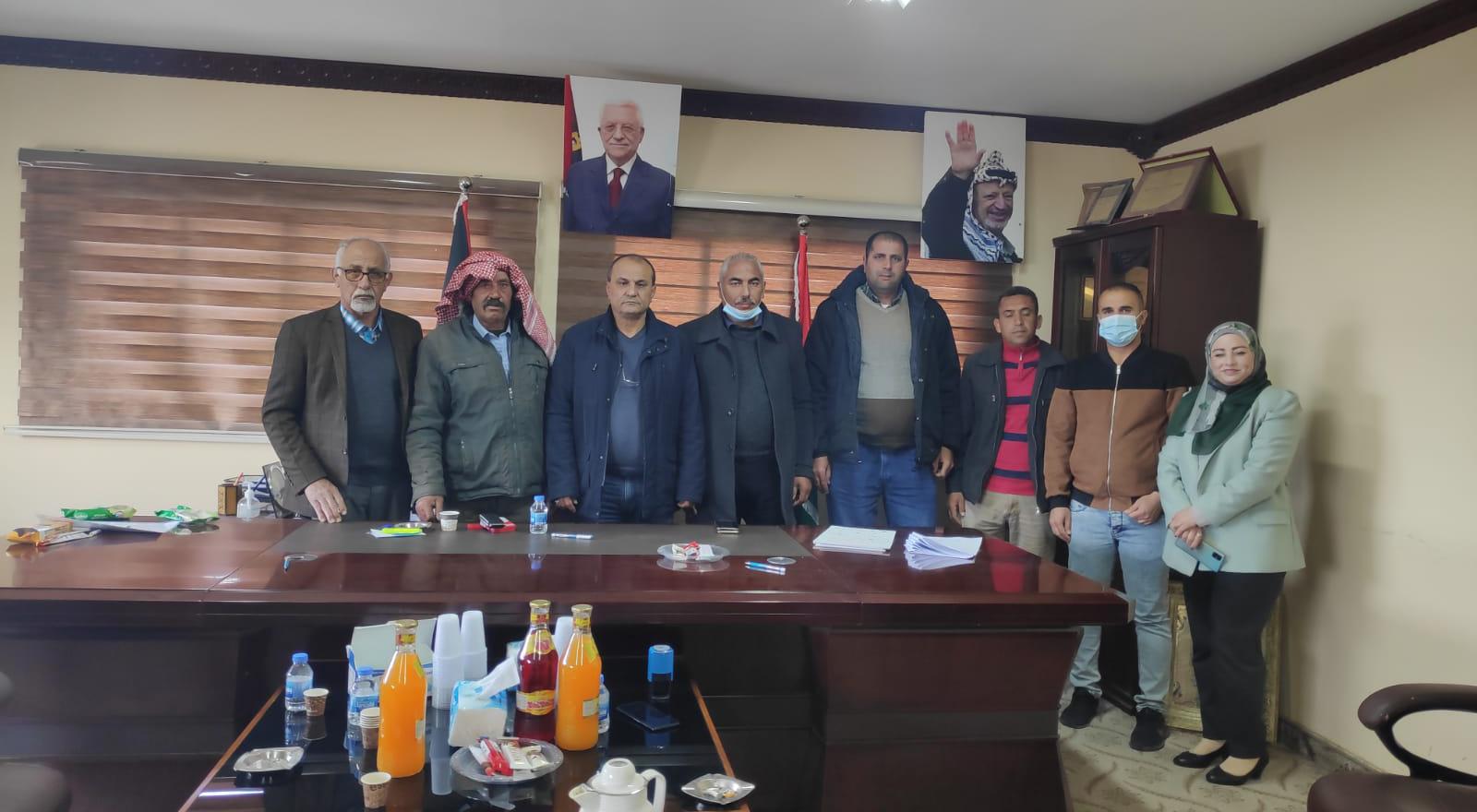
Bartaa cluster signed the joint service provision agreement
Roula HANDAL | 28/06/2021
As a continuation of LGRDP II objectives in supporting the territorial development integration between the Local Authorities (LAs), Bartaa Municipality and 6 other village councils signed an MoU for joint service provision. The MoU aims to improve the quality of service in terms of solid waste, water, building and licensing, electricity, and community engagement activities focusing on youth and women.The signed MoU keeps the political representation of the LAs and improves the service provision in a bottom-up approach that meets the LAs needs and the territorial development process.During the last three years, the joint efforts of the European Union, Enabel and the IPCC targeted the institutional development of Bartaa Municipality, capacity development activities, improve service provision within Bartaa Municipality (tools, equipment’s, systems, others…) in addition to better engagement of community especially women and youth.
-

For the first time in Gaza - SAWA project conducted the Go Green Hackathon for the industrial sector
Roula HANDAL | 28/06/2021
As a response to the challenges facing the industrial sector related to the green and circular economy in the Gaza Strip, Enabel implemented, EU funded SAWA project launched the Go Green Hackathon (3-days competition) on the 5th of April, 2021, with full cooperation and coordination with The Palestinian Federation Of Industries (PFI). The Hackathon hosted 30 groups of entrepreneurs -about 100 youth- to develop their solutions (30 solutions) for the industrial sector challenges in the field of green/circular economy in the Gaza Strip.At the end of the Hackathon, the top-ranked 15 solutions will participate in the second phase of the selection (detailed business planning). The most viable and sustainable 10 green solutions (entrepreneurs) will receive a package of financial and non-financial support and will be incubated by the PFI to having their ideas transferred into valuable businesses.
-

Amuddu échange avec ses partenaires sur les pratiques de mentorat comme levier d’intégration socio-économique des personnes migrantes et réfugiées
Clara HUYGHE | 24/06/2021
À l’occasion de la célébration de la Journée Mondiale des Réfugiés, le projet Amuddu a organisé un atelier d’échange le 24 juin 2021 à Rabat sous le thème du « Mentorat un levier pour l’intégration socio-économique des personnes migrantes et réfugiées ».Cet évènement fut l’occasion de faire la restitution de l’étude sur la pratique mentorale en faveur des personnes migrantes et réfugiées, menée dans le cadre de la mise en œuvre du projet Amuddu en partenariat avec le Ministère Délégué Chargé des MRE et des Affaires de la Migration (MDCMRE) et l’ANAPEC. Un manuel a été conçu sur base de cette étude sur le potentiel du mentorat comme levier d’intégration socio-économique des personnes migrantes ainsi que deux fiches pratiques « Je deviens mentor » et « J’adopte le mentorat au sein de mon entreprise ». Ce manuel est un outil de référence pour les partenaires désireux d’expérimenter l’approche du mentorat à destination des personnes migrantes et réfugiées.Les membres du Comité programme formation professionnelle et emploi (CP3), organe institué par la Stratégie Nationale d’Immigration et d’Asile (SNIA), ainsi que d’autres acteurs impliqués dans l’insertion professionnelle des personnes migrantes et réfugiées au Maroc et en Belgique tel que Le Forem, ont pris part à cette restitution. Une réflexion a également été menée autour de l’intérêt d’implémenter une telle approche dans les institutions publiques marocaines et les organisations de la société civile (OSC) qui cherchent à faciliter l’intégration économique des personnes migrantes et réfugiées. Il a aussi été question de partager quelques expériences pratiques exécutées ou en cours d’exécution. Enfin, cet atelier fut l’occasion de débattre et d’échanger sur le mentorat et de permettre ainsi l’ouverture de l’expérimentation de cette pratique dans l’intégration économique des personnes réfugiées et migrantes au Maroc. La journée Mondiale des Réfugiés est organisée par l’Agence des Nations unies pour les Réfugiés (UNHCR) conjointement avec le Ministère délégué auprès du Ministère des Affaires Etrangères et de la Coopération Africaine et des Marocains Résidents à l’Etranger, Chargé des Marocains Résidents à l’Etranger avec l’appui et le soutien d’Enabel.
-

VET Toolbox New Service Launch. Digital event, 08.06.2021 - VIDEO
Maarten DE RUYCK | 22/06/2021
Investment not only needs finance but also people with the right skills. The new VET Toolbox service supports - in close collaboration with other stakeholders - local people in 11 countries in Sub-Saharan African in acquiring those skills. Dialogue between the public and private sector will be at the basis of targeted actions in specific sectors or value chains.On 8th June 2021, VET Toolbox presented this new service during an online launch event attended by around 200 participants. Rewatch the videos that were presented during the launch event and/or download the powerpoint presentation and relevant documents via https://www.vettoolbox.eu/en/news/new-vet-toolbox-service-increase-local-benefits-european-investmen...
-
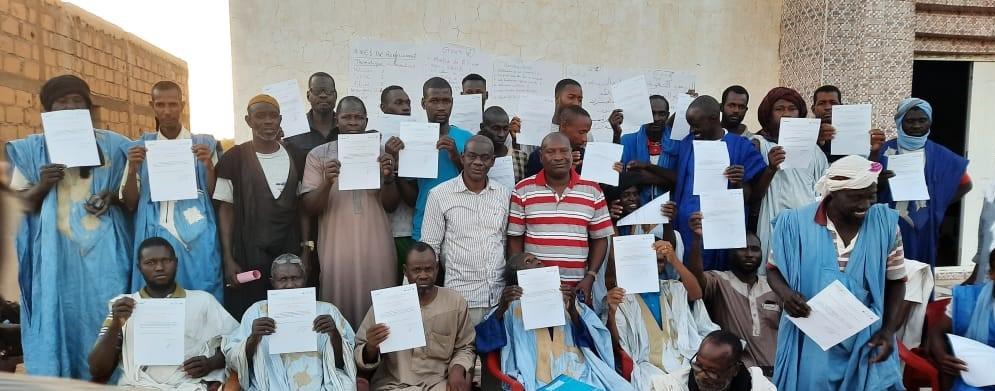
Enabel renforce les capacités des agro-pasteurs en Mauritanie
Aminata KANE | 21/06/2021
Remise des attestations de formation des facilitateurs des Champs Ecoles Agropastoral (CEAP) La finalité de cette formation est d’accompagner des acteurs de la filière des décrues tant en termes de structuration que d’acquisition de compétences organisationnelles ou techniques par la formation des facilitateurs autour d’un Champ Ecole Agro-Pastoral (CEAP). La sélection des facilitateurs (conseiller paysan) est faite dans les pôles de production de chaque wilaya (région) en collaboration avec les délégations régionales du ministère d’aménagement rural. L’équipe du projet était accompagné par les techniciens des délégations pour expliquer l’approche CEAP. Les critères de choix d’un facilitateur étaient : • Agriculteur des décrues • Résident dans son village • Motivé et accepté le choix porté sur lui • Représentatif du groupe de producteurs de son site • Capable de lire et écrire • Apte à participer aux formations : avoir au plus 50 ans. • Capable de pratiquer et d’assurer la transmission aux producteurs les techniques innovantes perçues lors des formations Les produits et bienfaits qui sont ressortis de cette activité sont entre autres : • Renforcement des facilitateurs sur les itinéraires techniques des principales culture des décrues • Mise en place du groupe de producteurs (environ 15 à 25 dans chaque site) pour chaque facilitateur • Mise en place d’un CEP (Champ Ecole Paysan) par facilitateur • Structuration des producteurs des décrues de chaque site avec le facilitateur • Mise en place de quelques mutuelles d'entraide des producteurs de certains sites • Appui conseil des producteurs par le facilitateur • Mise en place du maillon facilitateur de la filière des décrues, etc. L´approche Champs-Ecoles Agro-Pastoraux (CEAP) du RIMFIL vise à renforcer les capacités techniques et organisationnelles des agriculteurs et des pasteurs à travers l’amélioration de leurs capacités d´observation, d´analyse et de prise de décision. Les CEAP sont une déclinaison en milieu agro-pastoral des Champs Ecole Paysans (CEP). Ils sont une approche novatrice en Mauritanie de vulgarisation auprès des pasteurs et agro-pasteurs qui se basent sur la pratique et un apprentissage axé sur les problèmes diagnostiqués au sein des systèmes de production agricoles et pastoraux. Les activités d’appui spécifiques aux pasteurs pourront être développés selon leur nature (production laitière, santé animale…) dans un cadre autre que celui du champ-école paysan classique et de la parcelle agricole de productions. Après avoir participé avec succès aux 4 formations sur l’approche Champ Ecole Agropastoral (CEAP) des cultures de décrues et cultures vivrières, les facilitateurs des régions du Hodh El Chargui et Garbi, Guidimakha, Assaba ont reçus des coordinateurs des régions respectives leurs attestations de formations. Un suivi des facilitateurs est planifié même après la fin de la formation.
